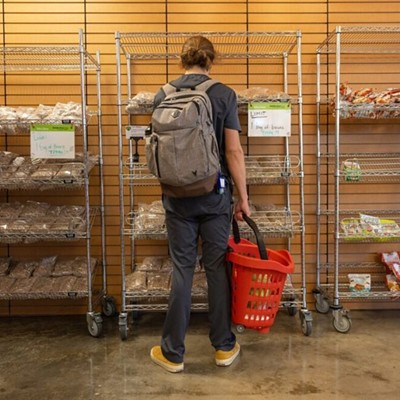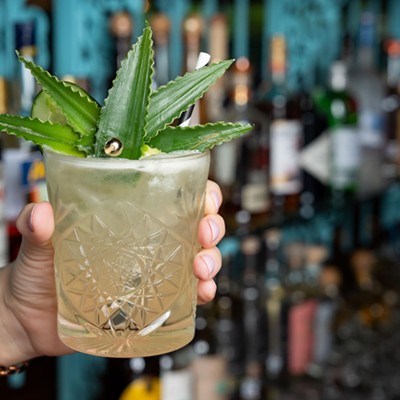One is a highbrow full-fledged restaurant -- a "brick-and-mortar" place, to use the parlance of the day -- owned and operated by heavyweight restaurateurs. The other is a cobbled-together food truck, ephemeral and fleeting by nature here in Houston, where the City actively targets mobile food vendors and where many trucks go under for reasons purely of their own creation.
Both, in this case, happen to serve some of the finer foods in life: steak tartare, filet mignon, lobster risotto, bone marrow service. Yes, two of those things come from a truck. If you're a regular reader of ours, you'll recognize the latter two as coming from The Modular, a tin can truck which is often camped out at a hipster dive bar on the edge of Montrose.
The first two come from Ava Kitchen & Whiskey Bar. And I inadvertently pitted the two establishments against each other on Friday night. Although not terribly surprised by the outcome -- in fact, I sometimes fear that we start to sound like broken records around here, constantly expressing dismay that the city's great cooks aren't cooking on a regular enough basis -- it stood out to me as representative of all the things both wrong and right with our city's culinary scene right now.
The long and short of it is this: I got a better meal for far less money and fussiness at The Modular than I received dining under beautiful but terribly expensive lampshades at Ava Kitchen & Whiskey Bar in West Ave on Friday night.
Our waiter at Ava was mostly absent, but aggressively pushy when he made his infrequent stops at our table: "Whaddya want to drink. You want a Pinot Noir? You want a Cabernet? You want a Syrah? Here, this one's good. Get this one," he rapid-fired as he pointed at the most expensive glasses in each category. The steak tartare and my four-ounce filet mignon were good, sturdy dishes, but my friend's asparagus salad and duck pappardelle were both woefully underseasoned and -- in the case of her entree -- dessicated and tough (yes, both the duck and the pasta). For the trouble of our time at the Schiller-Del Grande group's latest restaurant, we paid $132 (including tax and tip).
And we both left hungry, chuckling about the old Annie Hall adage of "terrible food," and "in such small portions."
Although we didn't intend to wind down at Grand Prize that night, the hipster dive bar ended up being our last destination, and we got there just as The Modular was about to shut down. We got their last meal of the night: a bowl of lobster risotto, garnished with fat ovals of claw meat and served alongside a whole lobster, as well as the now-infamous "marrow trough," a cow femur split in half, roasted and served with parsley salad and toasted slices of baguette.
There was no pomp and circumstance to this punk rock-plush meal. Instead of aggressively-sold glasses of wine, we sipped on some contraband sake aged in virgin Hungarian oak barrels, the unmarked bottle of sweetly buttery rice wine passed around like mother's milk. (I know exactly what this sounds like, but bear with me.) We told off-color jokes, loudly, and handed our plates directly back to the men who'd filled them after we were done. The cost per person of this feast? $26. $30 if you throw a few bucks in their jar for a tip.
But nightly feasts like these in the back of Grand Prize won't last forever (remember the Ghetto Dinners?). While restaurants can have a good run of maybe four or five years if they're lucky, a decade or longer if they're really great, food trucks have a markedly shorter expiration date. The menus at "gourmet" food trucks like The Modular usually don't stay the same either, due to the capricious nature of their owners and the fact that buying in bulk isn't always a possibility for guys with no walk-ins let alone any group purchasing power.
In addition to these elements and the continuing determination of the City to keep food trucks tightly regulated through exhaustive permitting processes and ever-increasing fees, the City also seems determined to make it difficult for small businesses like independently-operated restaurants to thrive inside the Loop -- the core of the city -- with revamped parking regulations that favor big-box retailers and restaurants.





